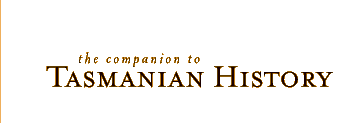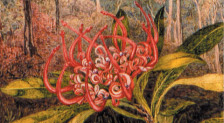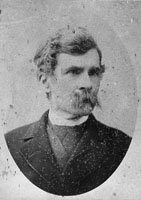 |
 |
|
Edward Braddon
Edward Nicholas Coventry Braddon (18291904), politician, was born in Cornwall, England. After leaving school he moved to India in 1847 and worked in a cousin's merchant firm, after which he managed indigo plantations. Braddon served in the Indian Mutiny in Purnea, then was employed as a civil servant for nineteen years. His longest employment was as a district officer, a position requiring much independent decision-making. Two books, Life in India (1872) and Thirty years of Shikar (1895), told of his Indian life. To his chagrin, administrative changes saw Braddon forced into premature retirement. In 1878 he and his second wife moved to north-west Tasmania, an area which attracted many AngloIndians at that time. The Braddons purchased a small property near Leith. Thirty letters describing his early Tasmanian experiences and published under the title, 'A Home in the Colonies', appeared in the Statesman and Friend (Calcutta and Delhi) in the second half of 1878. These were republished in 1980. A year after arriving in Tasmania, 'Ned' Braddon entered the House of Assembly where he soon shone as debater and strategist. He played a key role in the defeat of the Agnew government in 1887. Braddon was successively Minister for Lands and Works (188788), Agent-General in London (188893), Opposition leader (189394), and Premier (189499). His government largely restored Tasmanian finances, not least by wielding the 'Braddon Axe' in a determined reduction of government outlays. The Braddon government introduced proportional representation for House of Assembly elections, and challenged the Legislative Council through a Privy Council appeal that unsuccessfully sought a clarification of upper house powers. Braddon was knighted in 1891, and made Privy Councillor in 1897. The Braddon Government, the longest-serving to that time, fell in 1899, largely as a consequence of a scandal involving his Minister for Lands and Works, ET Miles. A keen federalist, Braddon was a member of the Federal Council of Australasia (1888, 189599), serving as president in 1895. He topped the Tasmanian poll for the 189798 Federation Convention, where he worked to defend the rights of the states, sponsoring section 87 (the 'Braddon Blot') to protect small states' finances. He campaigned vigorously in the two federation referenda campaigns, and Tasmania's overwhelming 'Yes' votes were due in large part to his efforts. Braddon was elected to the first House of Representatives as a Free Trader, and died at Leith while still a member of the House of Representatives. At the 1951 celebrations in honour of the jubilee of Federation, Braddon was the constitutional founder honoured by Tasmania. A memorial stands on Braddon's Lookout, Leith. Further reading: Australian Dictionary of Biography, vol. 7; S Bennett, 'Braddon in India', THRAPP, 26/70-84; S Bennett, Federation, Melbourne, 1975; S Bennett (ed.), A Home in the Colonies. Edward Braddon's Letters to India from North-West Tasmania 1878, Hobart, 1980; S Bennett, The Making of the Commonwealth, Melbourne, 1971; S Bennett, 'Political Corruption, the Fall of the Braddon Government and Hare-Clark Voting: E. T. Miles 18991900', THRAPP, 39/14562; S Bennett, and Bennett, Barbara, Biographical Register of the Tasmanian Parliament 18511960, Canberra, 1980; Cyclopedia of Tasmania, Hobart, 1900; A Deakin, The Federal Story, Melbourne, 1963; Dictionary of National Biography January 1901 December 1911, vol. I, 1912; FC Green (ed.), A century of responsible government 18561956, Hobart, 1956; J La Nauze, The Making of the Australian Constitution, Melbourne, 1972; Mercury, 3 February 1904.Scott Bennett |
Copyright 2006, Centre for Tasmanian Historical Studies |
